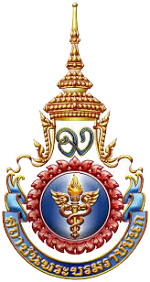ผลของโปรแกรมส่งเสริมการดูแลตนเอง ต่อความรู้ พฤติกรรมการดูแลตนเอง และความวิตกกังวลของผู้ป่วยมะเร็งไทรอยด์ก่อนการรักษาด้วยไอโอดีน 131 ขนาดสูง
คำสำคัญ:
โปรแกรมส่งเสริมการดูแลตนเอง, พฤติกรรมการดูแลตนเอง, ความวิตกกังวล, มะเร็งไทรอยด์, ไอโอดีน-131บทคัดย่อ
การวิจัยกึ่งทดลองครั้งนี้ มีวัตถุประสงค์เพื่อศึกษาผลของโปรแกรมส่งเสริมการดูแลตนเองต่อความรู้ พฤติกรรมการดูแลตนเองและความวิตกกังวลของผู้ป่วยมะเร็งไทรอยด์ก่อนการรักษาด้วยไอโอดีน 131 ขนาดสูง โรงพยาบาลศูนย์มะเร็งแห่งหนึ่ง ในช่วงเดือนตุลาคม พ.ศ. 2565 – สิงหาคม พ.ศ. 2566 คัดเลือกกลุ่มตัวอย่างตามเกณฑ์ และแบ่งกลุ่มด้วยวิธีการสุ่มอย่างง่าย เป็นกลุ่มควบคุม 36 ราย ได้รับการพยาบาลตามปกติ และกลุ่มทดลอง 36 ราย ได้รับโปรแกรมส่งเสริมการดูแลตนเอง 6 สัปดาห์ เก็บข้อมูลโดยใช้แบบสอบถามข้อมูลส่วนบุคคล แบบสอบถามความรู้เกี่ยวกับมะเร็งไทรอยด์และการเตรียมตัว แบบสอบถามพฤติกรรมการดูแลตนเองก่อนได้รับไอโอดีน 131 ขนาดสูง และแบบประเมินความวิตกกังวล มีค่าความเชื่อมั่นของแบบสอบถามเท่ากับ 0.79, 0.82 และ 0.91 ตามลำดับ วิเคราะห์ข้อมูลด้วยสถิติเชิงพรรณนา เปรียบเทียบข้อมูลก่อนและหลังได้รับโปรแกรมของกลุ่มทดลองด้วย Wilcoxon Sign Rank test และ Paired t-test เปรียบเทียบข้อมูลระหว่างกลุ่มควบคุมกับกลุ่มทดลองด้วย Mann-Whitney U test และ Independent t-test test
ผลการวิจัยพบว่า หลังได้รับโปรแกรม 6 สัปดาห์ กลุ่มทดลองมีคะแนนความรู้มากกว่าและคะแนนความวิตกกังวลน้อยกว่าก่อนได้รับโปรแกรม และคะแนนพฤติกรรมการดูแลตนเองมากกว่าหลังได้รับโปรแกรม 2 สัปดาห์ อย่างมีนัยสำคัญทางสถิติ (p= .001) และภายหลังได้รับโปรแกรม 6 สัปดาห์ กลุ่มทดลองมีคะแนนความรู้ คะแนนพฤติกรรมการดูแลตนเองมากกว่า และมีคะแนนความวิตกกังวลน้อยกว่ากลุ่มควบคุม อย่างมีนัยสำคัญทางสถิติ (p= .007, p= .000 และ p= .002 ตามลำดับ)
ข้อเสนอแนะ ควรมีการนำโปรแกรมส่งเสริมการดูแลตนเองไปใช้เป็นแนวทางในการดูแลผู้ป่วยมะเร็งไทรอยด์ที่ต้องได้รับไอโอดีน 131 ขนาดสูง เพื่อเพิ่มความรู้ความเข้าใจเกี่ยวกับการเตรียมตัวก่อนการรักษา ส่งผลให้มีผู้ป่วยมีพฤติกรรมในการดูแลตนเองที่ดี และมีความวิตกกังวลลดลง มารับการรักษาได้ตามนัด
เอกสารอ้างอิง
American Cancer Society. (2018). Cancer facts & figures Retrieved October 8, 2023 from https://www.cancer.org/research/cancer-facts-statistics/all-cancer-facts-figures/cancer-facts-figures-2018.html.
American Cancer Society. (2022). Cancer facts & figures. Retrieved October 10, 2023 from from https://www.cancer.org/research/cancer-facts-statistics/all-cancer-facts-figures/cancer-facts-figures-2022.html.
Auttayasaingam, P., & Yeekian, C. (2015). Knowledge, anxiety and opinions of pre-operation patient watched anesthetic TV channel. Thai Journal of Anesthesiology, 41(2), 92-102.
Barbus, E., Pestean, C., Larg, M. I., Gabora, K., Bonci, E. A., Badulescu., et al. (2018). Psychological impact of 131I radioprotection measures on thyroid cancer patients. Clujul Medical, 91(4), 441.
Banihashem, S., Arabzadeh, M., Bahri, R. S. J., & Qutbi, M. (2020). Psychological status and quality of life associated with radioactive iodine treatment of patients with differentiated thyroid cancer: Results of hospital anxiety and depression scale and short-form (36) health survey. Indian Journal of Nuclear Medicine: IJNM: The Official Journal of the Society of Nuclear Medicine, India, 35(3), 216.
Chun, N. (2012). Effect of depression and anxiety on symptoms in thyroid cancer patients undergoing radioactive iodine (I131) therapy. Asian Oncol Nurs ,12(4), 297-304.
Faul, F., Erdfelder, E., Lang, A. G., & Buchner, A. (2007). G*Power 3: a flexible statistical power analysis program for the social, behavioral, and biomedical sciences. Behavior research methods, 39(2), 175–191. https://doi.org/10.3758/bf03193146.
Herbert, G., Searle, A., England, C. Y., Ness, A., Beasley, M., Haupt-Schott, et aI. (2020). Experiences of low iodine diets in the treatment of differentiated thyroid cancer with radioactive iodine ablation therapy. Clinical nutrition ESPEN, 39, 190–197.
Jindakul, P., Namvongprom, A., Pakdevong, N. (2018). Effectiveness of the self-care promotion program for ability to take care of oneself perception of severity Side effects from chemotherapy and anxiety in early stage breast cancer patients undergoing adjuvant chemotherapy. Cancer Journal, 38(3), 105-116.
Jindawichak, S., Panchan, W., Chaiwirawattana, A., & Imsamran.W. (2015). Guidelines for diagnosis and treatment of thyroid cancer. Bangkok: Khosit Printing. (in Thai)
Jung, M. Y., Hong, I. K., Noh, H. Y., Park, H. S., Son, J. M., Kim, J. H., et al., (2015). Effects of video-based information provision on anxiety and education satisfaction of thyroid cancer patients undergoing radioiodine treatment. Journal of Korean Clinical Nursing Research, 21(1), 11-20.
Khanchan, A., Tonesakulrungruang, L., Samantreeporn, S., & Sajjanand, S. (2021). The effectiveness of mobile application in educating in radioactive iodine-131 therapy of hyperthyroidism in Nakhon Ratchasima province. Journal of Legal Entity Management and Local Innovation, 7(10), 273-284.
Koc, P., Karakoc, A., Ansal-Balci, T., Kepenek, F., & Atmaca, M. (2014). Anxiety and depression related to the hospitalization experience of patients receiving radioiodine ablation. Minerva Psichiatrica, 55(2), 77-81.
Lee, I., & Park, C. S. (2017). Convergent effects of anxiety, depression, uncertainty, and social support on quality of life in women with thyroid cancer. Journal of the Korea Convergence Society, 8(8), 163-176.
Maha Vajiralongkorn Thanyaburi Hospital. (2022). Cancer registry report. Phatumthani. (in Thai) Orem, D. E., Taylor, S. G., & Renpenning, K. M. (2001). Nursing: concepts of practice (6th ed.). St. Louis: Mosby.
Pourzare, S. L., Khankeh, H. R., Tabrizi, K. N., Biglarian, A., & Far, S. F. (2018). Effect of multimedia orientation tour on anxiety of patients with thyroid cancer of candidate iodine therapy. IJRN, 4 (4), 36-43.
Phuthiphen, P., Namwongphrom, A., & Phakdiwong, N. (2018). Self-care ability and perceived side effects intensity of chemotherapy in patients with colorectal cancer receiving educative-supportive program. In The 13th Graduate Research Presentation Conference. Rangsit University, Pathumthani. (in Thai)
Sipos, J. A. & Mazzaferri, E. L. (2010). Thyroid cancer epidemiology and prognostic variables. Clinical oncology, 22(6), 395-404.
Suratako, S., Namwongprom, N., & Phakdiwong. N. (2015). Information Satisfaction and Anxiety among Patients with Cancer Receiving Diagnostic PET/CT Scan. Private Higher Education Institutions Association of Thailand Under the patronage of Her Royal Highness Princess Maha Chakri Sirindhorn, 5(1), 69-79.
Taphongsa, S. (2020). Effect of the patient’s self-care program in differentiated thyroid cancer patients treated with radioactive Iodine 131. In The 54th World Congress on Nursing and Health Care. (in Thai)
Taphongsa, S., Wongsurawat, N., Hatawaikarn, B., Srichachet, K., & Ramkha, T. (2016). Relationships among Information Needs, Information Received, Self-Care Behaviors and Quality of Life in Well-differentiated Thyroid Cancer Patients Treated with Radioactive Iodine at Radiotherapy Ward 5A Srinagarind Hospital, KhonKean University. Srinagarind Medical Journal, 31(5), 122-126.
Terdsudthironapoom, P. (2015). The Effects of self-Care Promoting Program on Self-Care Behaviors and Quality of Life among Patients with Heart Failure in Prachuap khirikhan Hospital. Thai Journal of Cardio-Thoracic Nursing, 26(1), 2–14.
Thyroid Cancer Survivors’ Association. (2018). Thyroid cancer basics. Retrieved August 18, 2023 from https://www.thyca.org/download/document/350/TCBasics.pdf.
Ubolnuch, K. (2015). The Role of a Nurse in Nuclear Medicine. Journal of Research in Nursing-Midwifery and Health Sciences, 35(3), 191–206.

ดาวน์โหลด
เผยแพร่แล้ว
รูปแบบการอ้างอิง
ฉบับ
ประเภทบทความ
สัญญาอนุญาต
ลิขสิทธิ์ (c) 2024 วิทยาลัยพยาบาลบรมราชชนนี นครศรีธรรมราช

อนุญาตภายใต้เงื่อนไข Creative Commons Attribution-NonCommercial-NoDerivatives 4.0 International License.
บทความที่ได้รับการตีพิมพ์เป็นลิขสิทธิ์ของ วิทยาลัยพยาบาลบรมราชชนนี นครศรีธรรมราช
ข้อความที่ปรากฏในบทความแต่ละเรื่องในวารสารวิชาการเล่มนี้เป็นความคิดเห็นส่วนตัวของผู้เขียนแต่ละท่านไม่เกี่ยวข้องกับวิทยาลัยพยาบาลบรมราชชนนี นครศรีธรรมราช และบุคคลากรท่านอื่น ๆ ในวิทยาลัยฯ แต่อย่างใด ความรับผิดชอบองค์ประกอบทั้งหมดของบทความแต่ละเรื่องเป็นของผู้เขียนแต่ละท่าน หากมีความผิดพลาดใดๆ ผู้เขียนแต่ละท่านจะรับผิดชอบบทความของตนเองแต่ผู้เดียว





